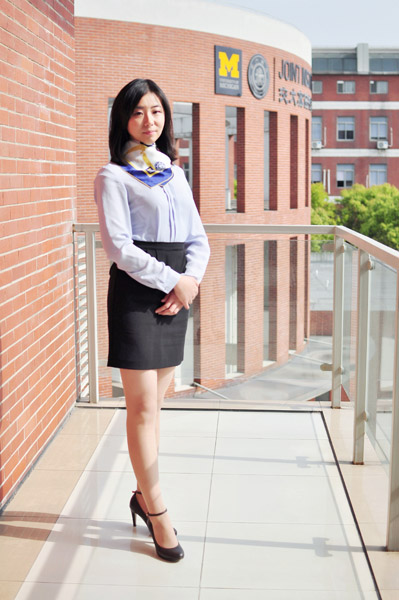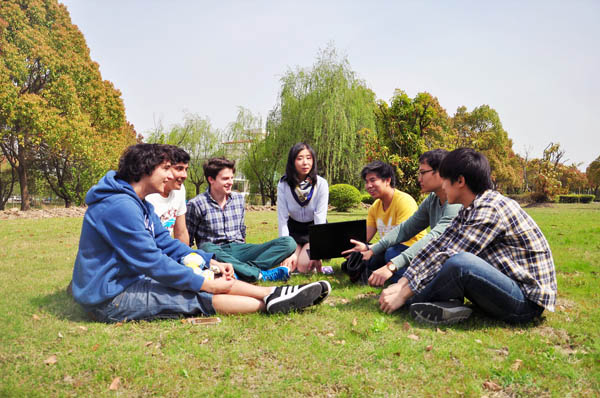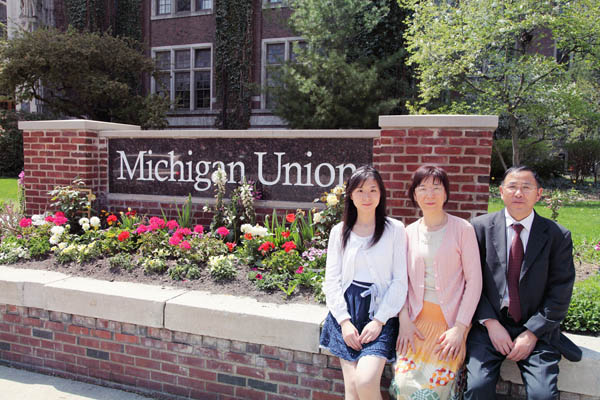Recently, JI has earned the recognition from NACAC, an organization of more than 13,000 professionals from around the world dedicated to serving students transitioning from secondary to postsecondary education. As JI’s International Recruitment Coordinator, Yu Zhang talks with NACAC about her recruitment experience at the University of Michigan – Shanghai Jiao Tong University Joint Institute (China). The following is the original text published on NACAC website.
 How has your career path led you to your current work as an international recruitment coordinator at the University of Michigan – Shanghai Jiao Tong University Joint Institute (China)?
How has your career path led you to your current work as an international recruitment coordinator at the University of Michigan – Shanghai Jiao Tong University Joint Institute (China)?
I went to the University of Michigan, Ann Arbor as an international student. I obtained my MA degree in higher education from UM, and then interned and worked for UM, helping to improve the university’s services for the international community. I was raised in Hangzhou, one of the most beautiful cities in China, which is also very close to Shanghai. Coming to the University of Michigan – Shanghai Jiao Tong University Joint Institute has been a great opportunity for me to be close to my hometown and also have the feeling of not being too far away from Michigan.
What is the value of NACAC not in only in your career, but in all aspects of your life?
My expertise was in international student affairs when I was at the University of Michigan, so recruiting was new for me. Many professionals in this area recommended that I join NACAC during my first year in the position. I learned a lot about recruiting from NACAC resources. Because I am currently the only one in international recruiting at the Joint Institute, I’m mainly inspired by the connections with other professionals through NACAC.
What opportunities and challenges do you face working in international recruitment?
There are not many high-quality international students who want to come to China to study engineering. Therefore, we are pioneers in recruiting. The number of international students coming to China has increased dramatically; we may, however, not have the same increase in proportion with engineering students. People may also have stereotypes that Chinese is a difficult language to learn. In terms of recruiting, we still have plenty of space and opportunities to improve our work and services. We are an institution following the administrative structure of the University of Michigan. Our official language is English. Most of our faculty members and lecturers get their degree overseas, mostly from the US. We use Michigan’s education system, so international students coming to JI feel like they are in a familiar environment. I believe this is very important.
 Zhang working with international students from the US, Norway, Portugal, Japan, South Korea, and Pakistan on campus
Zhang working with international students from the US, Norway, Portugal, Japan, South Korea, and Pakistan on campus
What makes the University of Michigan – Shanghai Jiao Tong University Joint Institute unique?
The Joint Institute’s curriculum blends the unique features of the University of Michigan and Shanghai Jiao Tong University. Aside from the curriculum, we also share Michigan’s faculty, academic credits and degrees to create a new educational model—transforming the current one prevalent in China’s higher education system. This model has proven effective for cultivating talents. It has been recognized by governments and organizations as a role model for Chinese higher education reform. For nine years, JI has successfully built a strong engineering program, reputable both domestically and aboard. In 2014, JI won the prestigious Andrew Heiskell Award from the Institute for International Education in New York for its innovations in international education.
As recruitment coordinator for a joint international program, how does your job differ from someone recruiting students for a single campus?
The biggest difference is my need to clarify the relationship and collaboration between the University of Michigan and the Shanghai Jiao Tong University. We are especially unique in our dual degree program, where students can simultaneously obtain two BS degrees—one from UM and the other from SJTU. In another program, the Sequential Graduate and Undergraduate program, students can obtain one BS degree from SJTU and an MS in engineering or business from UM. In other words, I basically need to explain what happens here, what we are and what we are doing, which usually is not necessary at other campuses.
Do you see any differences between Chinese and American students in terms of their interest in, and preparedness for, a higher education in engineering?
In brief, from my observation, because of the very different educational training backgrounds, I believe Chinese students in general are good at studying independently; whereas American students are very good at communication and coordination. We have one signature event at JI, called the “Design Expo,” where both senior and freshmen students are required to attend. We always have American students participate in the projects. Those teams with American students usually have better presentations, while those with Chinese students usually have more sophisticated projects.
 Zhang with her parents in front of Michigan Union, Ann Arbor
Zhang with her parents in front of Michigan Union, Ann Arbor
The Chinese Ministry of Education (MOE) regulates international partnerships between institutions of higher education in China and other countries. Do you know how students and counselors can confirm which programs, like the Joint Institute, are recognized or approved by the Chinese MOE?
You can find the list of certified joint international partnerships between institutions of higher education in China and other countries on the MOE’s website.
What are you passionate about outside of your career?
I am very passionate about my parents. Both of my parents cook well. I love going home and eating with them when I have time. I also like cooking. When I cook for them, I try to make food they appreciate. Also, because of my work, I have to travel a lot. I hope I can take my parents to my favorite places soon.
List five adjectives that best describe you:
• Honest
• Caring
• Kind
• Responsible
• Humorous
Background Information:
The National Association for College Admission Counseling (NACAC), founded in 1937, is an organization of more than 13,000 professionals from around the world dedicated to serving students transitioning from secondary to postsecondary education. It includes professional school counselors, college access counselors, admission and financial aid officers, and others.
A member-directed organization, NACAC is governed by its voting members; an Assembly of delegates elected by voting members in NACAC’s state and regional affiliates and by an elected Board of Directors.
NACAC holds several annual professional development events, including a national conference, and runs the National College Fairs program and Performing and Visual Arts College Fairs program which directly connect high school students with a wide variety of postsecondary institutions.





